_________________________________________________
Update From Pollitecon Publications
January 2023 ________________________________________________
Sign
up to receive Updates
Many new books and some articles and videos have been added to the
Pollitecon website and Free Ebooks Library.
Massive Rally in Skopje to Support the Macedonians in Bulgaria
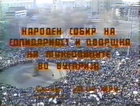 Before
the Republic of Macedonia gained its independence in 1991, the Government
and the people strongly supported the Macedonian minority in Pirin Macedonia
and Bulgaria. In February 1990 a massive rally was held in central Skopje
called National Rally for Solidarity and Assistance to the Macedonians
in Bulgaria. A video of this inspiring rally is Here.
Before
the Republic of Macedonia gained its independence in 1991, the Government
and the people strongly supported the Macedonian minority in Pirin Macedonia
and Bulgaria. In February 1990 a massive rally was held in central Skopje
called National Rally for Solidarity and Assistance to the Macedonians
in Bulgaria. A video of this inspiring rally is Here.
Diary - My Fight in the Aegean Part of Macedonia (1946 – 1949)
-140.jpg) The
book Diary - My Fight in the Aegean Part of Macedonia (1946 – 1949), is
a first hand account of events in the Greek Civil War by Georgi Hristovski,
who was the commander of the Macedonian units in the Aegean part of Macedonia.
Hristovski was born in the village of Turje, Lerinsko, in 1916. He had
wide military experience and participated in the Greco-Italian War, served
in ELAS and then in the Yugoslav Army as a non-commissioned officer and
as an officer captain, and from 1946 to 1949 participated in DAG in Greece
in various positions. He was a witness and participant in a large number
of military clashes at Gramos, Vicho and elsewhere, and the diary is full
of his military observations and people from many villages. It also has
the names of over 250 Macedonian soldiers who died, were wounded, or participated
in the war. The book was edited by Hristovski's brother Sotir Ristovski
and Aleksandar Donski, translated into English by Bube Donska, and published
by the Macedonian Literary Association "Grigor Prlichev". The ebook is
Here.
The Macedonian version is Here.
The
book Diary - My Fight in the Aegean Part of Macedonia (1946 – 1949), is
a first hand account of events in the Greek Civil War by Georgi Hristovski,
who was the commander of the Macedonian units in the Aegean part of Macedonia.
Hristovski was born in the village of Turje, Lerinsko, in 1916. He had
wide military experience and participated in the Greco-Italian War, served
in ELAS and then in the Yugoslav Army as a non-commissioned officer and
as an officer captain, and from 1946 to 1949 participated in DAG in Greece
in various positions. He was a witness and participant in a large number
of military clashes at Gramos, Vicho and elsewhere, and the diary is full
of his military observations and people from many villages. It also has
the names of over 250 Macedonian soldiers who died, were wounded, or participated
in the war. The book was edited by Hristovski's brother Sotir Ristovski
and Aleksandar Donski, translated into English by Bube Donska, and published
by the Macedonian Literary Association "Grigor Prlichev". The ebook is
Here.
The Macedonian version is Here.
Changes in Ethnic Structure in Macedonia after Emigration of Turkish
Minority
 The
dramatic changes in the Turkish population of Macedonia in the 1950s
are analyzed and discussed in the paper Changes in Ethnic Structure
in Macedonia after Emigration of Turkish Minority. Using the best available
data, author Emilija Trendafilova gives an overview of population changes
after the Balkan Wars and then focuses on the Republic of Macedonia
in the 1950s when over 127,000 ethnic Turks voluntarily moved to Turkey.
The main reasons were that Turkish president Adnan Menderes "invited
all the Turks to came back to their country, everyone was promised land
and properties mainly in the regions of Anatolia and Little Asia. This
can be understood also and as a political move of the president Menderes
in aim to fulfill the Turkish unpopulated areas that were abandoned
by the Greeks when they emigrated from Turkey." There was also a "great
will of Turkey to accept the immigrants in their native country" and
to help them find a viable existence in their homeland. The paper then
looks at the social changes in Macedonia following the migration including
the increase in the Albanian minority. The paper is Here.
The
dramatic changes in the Turkish population of Macedonia in the 1950s
are analyzed and discussed in the paper Changes in Ethnic Structure
in Macedonia after Emigration of Turkish Minority. Using the best available
data, author Emilija Trendafilova gives an overview of population changes
after the Balkan Wars and then focuses on the Republic of Macedonia
in the 1950s when over 127,000 ethnic Turks voluntarily moved to Turkey.
The main reasons were that Turkish president Adnan Menderes "invited
all the Turks to came back to their country, everyone was promised land
and properties mainly in the regions of Anatolia and Little Asia. This
can be understood also and as a political move of the president Menderes
in aim to fulfill the Turkish unpopulated areas that were abandoned
by the Greeks when they emigrated from Turkey." There was also a "great
will of Turkey to accept the immigrants in their native country" and
to help them find a viable existence in their homeland. The paper then
looks at the social changes in Macedonia following the migration including
the increase in the Albanian minority. The paper is Here.
UMD Voice Magazines
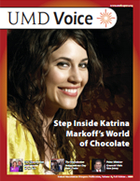 Seventeen
editions of the United Macedonian Diaspora's UMD Voice Magazine are
now available in the Pollitecon Free Ebooks Library. 14 of the magazines
are in English and three are in Macedonian. The editions start with
the first and were published between 2007 and 2016. The articles focus
on Macedonian politics, history, culture and business, including interviews
and profiles of notable and successful Macedonians in the diaspora.
The magazines are Here.
Seventeen
editions of the United Macedonian Diaspora's UMD Voice Magazine are
now available in the Pollitecon Free Ebooks Library. 14 of the magazines
are in English and three are in Macedonian. The editions start with
the first and were published between 2007 and 2016. The articles focus
on Macedonian politics, history, culture and business, including interviews
and profiles of notable and successful Macedonians in the diaspora.
The magazines are Here.
Bright Figures From Aegean Macedonia (1945-1949)
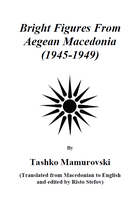 Bright
Figures From Aegean Macedonia (1945-1949) is the English title of the
newly translated book Svetli Likovi od Egejska Makedonija 1945-1949
by Tashko Mamurovski. The author says the book briefly presents "the
life and revolutionary activities of some of the more prominent fighters
and leaders of the Macedonian National Liberation Movement (NOF) who,
as successors of their Ilinden ancestors, died in the period from 1945
to1949. We also wanted to present a general picture of the activities
in which these people were involved during the struggle." There are
49 pen portraits in the book, some of well known figures, others of
less known or relatively unknown figures. The English version, translated
by Risto Stefov, is Here.
The Macedonian version is Here.
Bright
Figures From Aegean Macedonia (1945-1949) is the English title of the
newly translated book Svetli Likovi od Egejska Makedonija 1945-1949
by Tashko Mamurovski. The author says the book briefly presents "the
life and revolutionary activities of some of the more prominent fighters
and leaders of the Macedonian National Liberation Movement (NOF) who,
as successors of their Ilinden ancestors, died in the period from 1945
to1949. We also wanted to present a general picture of the activities
in which these people were involved during the struggle." There are
49 pen portraits in the book, some of well known figures, others of
less known or relatively unknown figures. The English version, translated
by Risto Stefov, is Here.
The Macedonian version is Here.
The Macedonian Meaning of the Names from the Trojan Wars
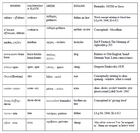 Authors
Kosta Peev and Odyssey Belchevsky have published a paper titled The
Proto-Slavic – Macedonian Meaning of the Names from the Trojan Wars-Homeric
Age. The paper discusses the origin, history and language of the Homeric
epics about the Trojan War. Based on the works of numerous scholars
as well as original research, the paper examines the many links between
the language used by Homer and the modern Macedonian and Slavic languages.
It says "Most importantly, their Macedonian meaning matches the deeds,
attributes, appearance, powers and characteristics of these Epic heroes."
These links and meanings are exampled in a brief Homeric to Macedonian
and Slavic Vocabulary with Greek and English Translation. The authors
conclude that the links indicate "that the ancestors of the modern Slavic
nations lived and flourished in the Homeric times in Southern Europe".
The paper is Here.
Authors
Kosta Peev and Odyssey Belchevsky have published a paper titled The
Proto-Slavic – Macedonian Meaning of the Names from the Trojan Wars-Homeric
Age. The paper discusses the origin, history and language of the Homeric
epics about the Trojan War. Based on the works of numerous scholars
as well as original research, the paper examines the many links between
the language used by Homer and the modern Macedonian and Slavic languages.
It says "Most importantly, their Macedonian meaning matches the deeds,
attributes, appearance, powers and characteristics of these Epic heroes."
These links and meanings are exampled in a brief Homeric to Macedonian
and Slavic Vocabulary with Greek and English Translation. The authors
conclude that the links indicate "that the ancestors of the modern Slavic
nations lived and flourished in the Homeric times in Southern Europe".
The paper is Here.
This is My Life - Ova e Mojot Zhivot
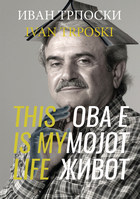 Prize
winning Macedonian-Australian poet Ivan Trposki has written his autobiography
to commemorate his 80th birthday and to leave a record of their history
for his family. The author was born in the village of Volino, Ohrid
region and migrated and settled in Sydney in 1968. As he was a young
adult at that time he is able to give a detailed account of his early
life in his village and in Macedonia. In Australia, as well as establishing
family life and being involved in community life, he has for decades
been active in Macedonian writing and publishing. His poetry has been
published widely in Australia and Macedonia, he has authored numerous
books of poetry and has won numerous literary awards. He has been a
member of the Literary Society Grigor Prlichev in Sydney since 1979.
The book is in Macedonian and is Here.
Prize
winning Macedonian-Australian poet Ivan Trposki has written his autobiography
to commemorate his 80th birthday and to leave a record of their history
for his family. The author was born in the village of Volino, Ohrid
region and migrated and settled in Sydney in 1968. As he was a young
adult at that time he is able to give a detailed account of his early
life in his village and in Macedonia. In Australia, as well as establishing
family life and being involved in community life, he has for decades
been active in Macedonian writing and publishing. His poetry has been
published widely in Australia and Macedonia, he has authored numerous
books of poetry and has won numerous literary awards. He has been a
member of the Literary Society Grigor Prlichev in Sydney since 1979.
The book is in Macedonian and is Here.
Monograph - Gojko Jakovleski
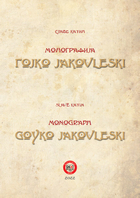 The
book Monograph - Gojko Jakovleski by Slave Katin is the story of Macedonian
activist Gojko Jakovleski, who is well known for his political work
in support of an autonomous, independent and united ethnic Macedonia
and for the unification of the Macedonian people. With Dragan Bogdanovski
he helped found the Democratic Party for Macedonian People's Unity,
now known as VMRO-DPMNE. Jakovleski is a businessman, investor, humanist
and donor. He was born in Gostivar and has lived in Berlin for many
years. The book is in both English and Macedonian and is Here.
The
book Monograph - Gojko Jakovleski by Slave Katin is the story of Macedonian
activist Gojko Jakovleski, who is well known for his political work
in support of an autonomous, independent and united ethnic Macedonia
and for the unification of the Macedonian people. With Dragan Bogdanovski
he helped found the Democratic Party for Macedonian People's Unity,
now known as VMRO-DPMNE. Jakovleski is a businessman, investor, humanist
and donor. He was born in Gostivar and has lived in Berlin for many
years. The book is in both English and Macedonian and is Here.
The Center Text on the Rosetta Stone
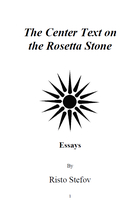 Author
Risto Stefov says the aim of his book The Center Text on the Rosetta
Stone is to highlight the most recent developments with regards to the
Rosetta stone center text translation by Academics Tome Boshevski and
Professor Dr. Aristotel Tentov. However he also says "Much more work
has been done on the translation since these essays were written in
2006, so if you wish to find out more please visit the website: http://rosetta-stone.etf.ukim.edu.mk/".
The essays look at the origin of the Stone, the attempts at deciphering
its three texts, and the work of Boshevski and Tentov. The academics
were not satisfied with past translations of the stone's center text.
They asked "What if the center text on the Rosetta stone is not Egyptian,
what if it is Ancient Macedonian?" The essays give a detailed account
of their detective work and their conclusions. The book is Here.
Author
Risto Stefov says the aim of his book The Center Text on the Rosetta
Stone is to highlight the most recent developments with regards to the
Rosetta stone center text translation by Academics Tome Boshevski and
Professor Dr. Aristotel Tentov. However he also says "Much more work
has been done on the translation since these essays were written in
2006, so if you wish to find out more please visit the website: http://rosetta-stone.etf.ukim.edu.mk/".
The essays look at the origin of the Stone, the attempts at deciphering
its three texts, and the work of Boshevski and Tentov. The academics
were not satisfied with past translations of the stone's center text.
They asked "What if the center text on the Rosetta stone is not Egyptian,
what if it is Ancient Macedonian?" The essays give a detailed account
of their detective work and their conclusions. The book is Here.
Boiling Point (Lockdown)
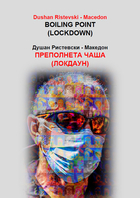 Boiling
Point (Lockdown) - Prepolna Chasha (Lokdoyn) is a radio play about Covid
19 by Macedonian-Australian playwright Dushan Ristevski. The play is
set in a Macedonian home where three generations live together in a
Sydney suburb and struggle to cope with the Covid-19 pandemic. There
is an engagement but also a lockdown. More dramatic tension arises through
lockdown restrictions, traditional medicine, job loss, domestic violence,
fear, the vaccine, depression, disappointment, the boiling point, and
hope. Over many plays the author has shown great skill in combining
contemporary social issues with humour and a Macedonian flavour. The
book, with both English and Macedonian versions, is Here.
Boiling
Point (Lockdown) - Prepolna Chasha (Lokdoyn) is a radio play about Covid
19 by Macedonian-Australian playwright Dushan Ristevski. The play is
set in a Macedonian home where three generations live together in a
Sydney suburb and struggle to cope with the Covid-19 pandemic. There
is an engagement but also a lockdown. More dramatic tension arises through
lockdown restrictions, traditional medicine, job loss, domestic violence,
fear, the vaccine, depression, disappointment, the boiling point, and
hope. Over many plays the author has shown great skill in combining
contemporary social issues with humour and a Macedonian flavour. The
book, with both English and Macedonian versions, is Here.
Inaetchijata Job
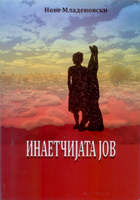 Inaetchijata
Job is a new novel by author, Nove Mladenovski. The story is about a
Macedonian called Job, named after the Biblical character, who develops
cancer. It follows his life before the cancer appeared and his journey
through its unpredictable challenges. It also follows his romantic life
and the key role of his wife. The story is set in Macedonia, Croatia,
Serbia, New Zealand and Australia. Like the once-prosperous then much-suffering
Biblical Job, the hero and the story are also very much focused on health
and recovery. The reviewer, Vasil Tocinovski, says the novel has a strong
autobiographical element. The book, in Macedonian, is Here.
Inaetchijata
Job is a new novel by author, Nove Mladenovski. The story is about a
Macedonian called Job, named after the Biblical character, who develops
cancer. It follows his life before the cancer appeared and his journey
through its unpredictable challenges. It also follows his romantic life
and the key role of his wife. The story is set in Macedonia, Croatia,
Serbia, New Zealand and Australia. Like the once-prosperous then much-suffering
Biblical Job, the hero and the story are also very much focused on health
and recovery. The reviewer, Vasil Tocinovski, says the novel has a strong
autobiographical element. The book, in Macedonian, is Here.
40 Poklonenija Pred Grobot na Sv. Kiril Filosof vo Rim
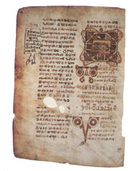 The
book 40 Poklonenija Pred Grobot na Sv. Kiril Filosof vo Rim was published
in 2008 to mark the 40th anniversary of Macedonian pilgrimages to the
grave of Saints Kiril and Metodij in Rome. The authors, Vera Stojchevska-Antich,
Slave Nikolovski-Katin and Episkop Kliment say that wanted to present
in one overview the most important activities in the period from 1969
to 2007 that relate to the traditions of Kiril and Metodij. In this
way, they show respect to the holy brothers and their disciples for
their epoch-making work in the establishment of Macedonian and Slavic
literacy and literature. The book is also generously illustrated with
historical and religious photographs and images. The book, in Macedonian,
is Here.
The
book 40 Poklonenija Pred Grobot na Sv. Kiril Filosof vo Rim was published
in 2008 to mark the 40th anniversary of Macedonian pilgrimages to the
grave of Saints Kiril and Metodij in Rome. The authors, Vera Stojchevska-Antich,
Slave Nikolovski-Katin and Episkop Kliment say that wanted to present
in one overview the most important activities in the period from 1969
to 2007 that relate to the traditions of Kiril and Metodij. In this
way, they show respect to the holy brothers and their disciples for
their epoch-making work in the establishment of Macedonian and Slavic
literacy and literature. The book is also generously illustrated with
historical and religious photographs and images. The book, in Macedonian,
is Here.
Vo Chest na Svetite Kiril i Metodij
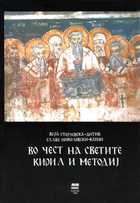 The
book Vo Chest na Svetite Kiril i Metodij/ In Honor of the Saints Kiril
and Metodij discusses and celebrates the activities, institutions, gatherings,
people and personalities, publications and other manifestations undertaken
in the name of the two saints of Macedonian literacy and their disciples.
The activities cover the period from 1944 to 1994, both in Macedonia
and internationally. The authors, Vera Stojchevska-Antich and Slave
Nikolovski-Katin, say these works offer possibilities for other related
religious and literary undertakings. The book, in Macedonian, is Here.
The
book Vo Chest na Svetite Kiril i Metodij/ In Honor of the Saints Kiril
and Metodij discusses and celebrates the activities, institutions, gatherings,
people and personalities, publications and other manifestations undertaken
in the name of the two saints of Macedonian literacy and their disciples.
The activities cover the period from 1944 to 1994, both in Macedonia
and internationally. The authors, Vera Stojchevska-Antich and Slave
Nikolovski-Katin, say these works offer possibilities for other related
religious and literary undertakings. The book, in Macedonian, is Here.
Makedonski Iselenicki Panoptikum
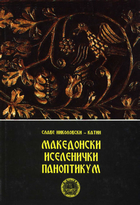 The
book Makedonski Iselenicki Panoptikum by Slave Katin is a detailed look
at the Macedonian diaspora, mainly in Canada, USA and Australia. The
focus is on churches, community centres, newspapers and book publishing,
radio and television programs, and folklore groups and centres. A number
of prominent Macedonians and Macedonian donators in these areas are
also profiled. The book was published in Macedonian in 1996 and is Here.
The
book Makedonski Iselenicki Panoptikum by Slave Katin is a detailed look
at the Macedonian diaspora, mainly in Canada, USA and Australia. The
focus is on churches, community centres, newspapers and book publishing,
radio and television programs, and folklore groups and centres. A number
of prominent Macedonians and Macedonian donators in these areas are
also profiled. The book was published in Macedonian in 1996 and is Here.
Siljan Micevski
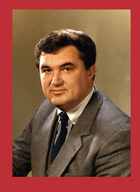 Siljan
Micevski by Slave Nikolovski-Katin and Gjorgji Lumburovski is a biography
of the well-known Macedonian handball player, businessman, mayor, activist
and honorary consul. Micevski is from Bitola and the book begins with
its history and contains many beautiful photos of the city. The biography
then moves to his family, life and many activities and achievements
in business, sport and politics. As well as being a major employer through
his business, Micevski was the mayor of Bitola from 1996 to 2000, the
Honorary Consul for Macedonia in Serbia, president of the Association
of Macedonian-Turkish Friendship – Bitola, and helped develop relations
between Bitola and the nearby Macedonians in Lerin, Kozhani and Korcha,
among many other activities. The book, in Macedonian, is Here.
Siljan
Micevski by Slave Nikolovski-Katin and Gjorgji Lumburovski is a biography
of the well-known Macedonian handball player, businessman, mayor, activist
and honorary consul. Micevski is from Bitola and the book begins with
its history and contains many beautiful photos of the city. The biography
then moves to his family, life and many activities and achievements
in business, sport and politics. As well as being a major employer through
his business, Micevski was the mayor of Bitola from 1996 to 2000, the
Honorary Consul for Macedonia in Serbia, president of the Association
of Macedonian-Turkish Friendship – Bitola, and helped develop relations
between Bitola and the nearby Macedonians in Lerin, Kozhani and Korcha,
among many other activities. The book, in Macedonian, is Here.
Another Mother
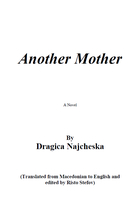 Another
Mother is a novel by Dragica Najcheska. Set during the 1963 Skopje earthquake
it shows how a young girl deals with the loss of her mother and her
father's re-marriage. The focus is on the two families and their emotional
experiences and development. It also tells of the earthquake's high
mortal and material damage, and the experiences of the residents of
Skopje and the changes to their relationships and emotional and mental
health. Another Mother is Here.
The Macedonian version, Druga Majka, is Here.
Another
Mother is a novel by Dragica Najcheska. Set during the 1963 Skopje earthquake
it shows how a young girl deals with the loss of her mother and her
father's re-marriage. The focus is on the two families and their emotional
experiences and development. It also tells of the earthquake's high
mortal and material damage, and the experiences of the residents of
Skopje and the changes to their relationships and emotional and mental
health. Another Mother is Here.
The Macedonian version, Druga Majka, is Here.
Otsiron's Dilemma The Alien that Changed the World (Part 4)
The latest instalment of Risto Stefov's novel, The Alien that Changed
the World, Part 4, Otsiron's Dilemma, is Here.
Book Interviews
Here are five interviews by Victor Bivell on SBS Radio about free Macedonian
ebooks. The interviews are in English.
On: Macedonia Before Alexander, Heroes and Assassins, and The Works
of Slave Katin, Here.
On: Macedonian Immigrants in Canada and Their Background, and Macedonian
Political Uprisings, Here.
On: Macedonia's Ancient and Modern History, Illustrated Macedonian
History, and Ilinden i Urugvaj (news reports on the Ilinden Uprising),
Here.
On: the popularity of books on Macedonian villages and several free
village ebooks on the Pollitecon website. The villages discussed are
in the Bitola region and include Vranjevci, Brnik, Bach and Oreovo,
Here.
On: Mariovo - Zhiva Istorija, and 150 Immigrants to America Whose Race
Was Defined As Macedonian in the Early 20th Century, Here.
Books by Other Publishers
Povod Magazine Relaunched
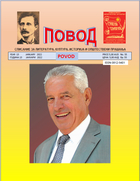 The
Australian Macedonian Literary Association "Grigor Prlichev" of Sydney
has decided, after a break of 32 years, to republish the magazine "Povod".
54 issues of Povod were published between 1978 and 1990. Focused on
literature, culture, history and social issues, the magazine was an
organ of the Association and helped to nurture the Macedonian literary
language and culture in Australia. It encouraged its members to create
and publish their own works and to promote their identity and nation.
Association president Dushan Ristevski said the aim is to continue this
work. Povod publishes articles, poetry and news about authors and new
books. Material is in either or both Macedonian and English. Four issues
of the magazine were published in 2022. These are in paper and PDF format.
It is distributed among the Association's members, lovers of the written
word, and the Macedonian community. Mr Ristevski said the Association
is now celebrating its 45th year. People interested in Povod can contact
Mr Ristevski by email Here.
The
Australian Macedonian Literary Association "Grigor Prlichev" of Sydney
has decided, after a break of 32 years, to republish the magazine "Povod".
54 issues of Povod were published between 1978 and 1990. Focused on
literature, culture, history and social issues, the magazine was an
organ of the Association and helped to nurture the Macedonian literary
language and culture in Australia. It encouraged its members to create
and publish their own works and to promote their identity and nation.
Association president Dushan Ristevski said the aim is to continue this
work. Povod publishes articles, poetry and news about authors and new
books. Material is in either or both Macedonian and English. Four issues
of the magazine were published in 2022. These are in paper and PDF format.
It is distributed among the Association's members, lovers of the written
word, and the Macedonian community. Mr Ristevski said the Association
is now celebrating its 45th year. People interested in Povod can contact
Mr Ristevski by email Here.
Edinakovci - My Village
 Macedonian-Australian
Blagoja Bozinoski has authored and published the book Edinakovci My
Village/ Edinakovci Moeto Selo. Edinakovci is near Demir Hisar between
Bitola and Prilep. Mr Bozinoski is from the village and moved to Australia
in 1972. Along with historical, geographic and economic information,
the book focuses on the families who live in or have left the village.
This includes their histories and family lineages. The author says there
are 21 family surnames that have expanded to more than 100 families
since migration. There are numerous photographs. The 370 page book is
in Macedonian and English. Mr Bozinoski said the book is a gift to the
village and can be obtained for only $10 plus postage. All money will
go towards the completion of the Church of St. Nikola in the village.
People interested in the book can contact Mr Bozinoski by email Here.
Macedonian-Australian
Blagoja Bozinoski has authored and published the book Edinakovci My
Village/ Edinakovci Moeto Selo. Edinakovci is near Demir Hisar between
Bitola and Prilep. Mr Bozinoski is from the village and moved to Australia
in 1972. Along with historical, geographic and economic information,
the book focuses on the families who live in or have left the village.
This includes their histories and family lineages. The author says there
are 21 family surnames that have expanded to more than 100 families
since migration. There are numerous photographs. The 370 page book is
in Macedonian and English. Mr Bozinoski said the book is a gift to the
village and can be obtained for only $10 plus postage. All money will
go towards the completion of the Church of St. Nikola in the village.
People interested in the book can contact Mr Bozinoski by email Here.
More Free Ebooks
There are now 470 free ebooks in The
Pollitecon Free Ebooks Library.
Macedonia Needs Macedonians

Please remember that Macedonia Needs Macedonians. The Facebook page
for the Macedonia Needs Macedonians group is Here.
Two major tourism portals are Travel2Macedonia which is Here,
and Macedonia - Timeless which is Here.
Canadian Macedonian Books
 A
reminder that Canadian Macedonian Books has a great selection of Macedonian
books in English from around the world. These include non-fiction, fiction,
children's and cook books. Canadian Macedonian Books is run by Virginia
Evans, a former co-president of the Canadian Macedonian Historical Society
and founder of the Macedonian Film Festival in Toronto. Canadian Macedonian
Books is Here.
A
reminder that Canadian Macedonian Books has a great selection of Macedonian
books in English from around the world. These include non-fiction, fiction,
children's and cook books. Canadian Macedonian Books is run by Virginia
Evans, a former co-president of the Canadian Macedonian Historical Society
and founder of the Macedonian Film Festival in Toronto. Canadian Macedonian
Books is Here.
Sign
up to receive Pollitecon Updates
Thank you
Victor Bivell
Pollitecon Publications
PO Box 3411
Wareemba NSW 2046 Australia
Ph 02 9705 0578
Email vbivell @ pollitecon.com
Web http://www.pollitecon.com
More Updates

